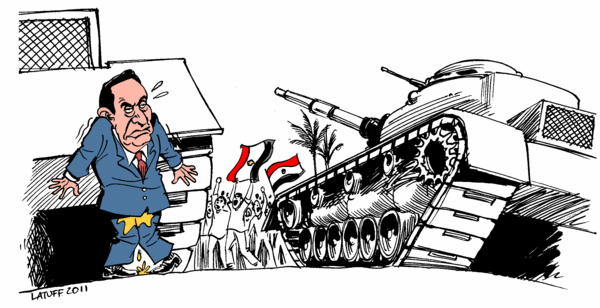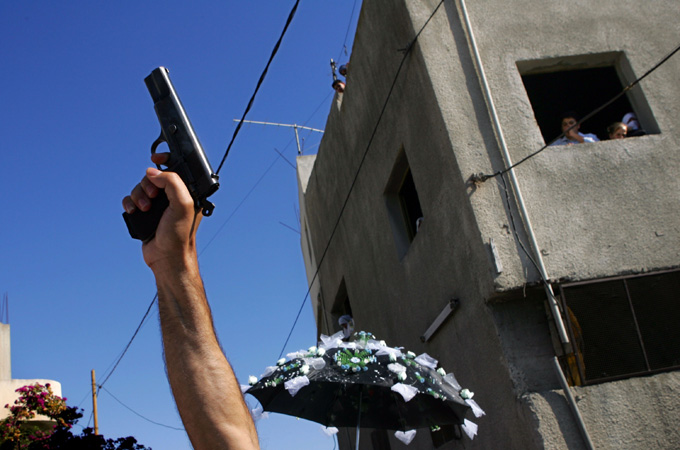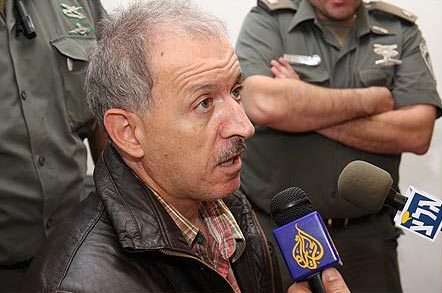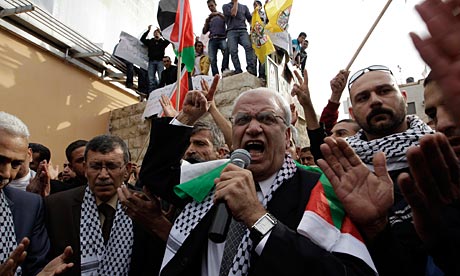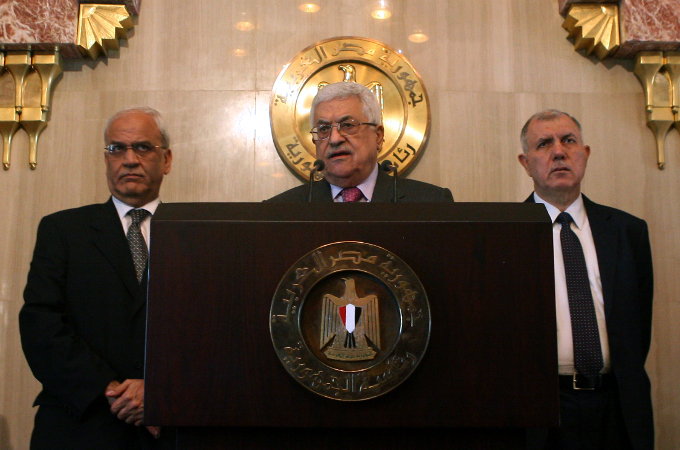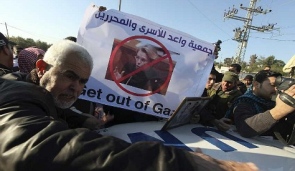BREAKING NEWS!!!
Clashes rage in Tahrir Square: Al Jazeera online
At least one dead and hundreds injured as pro-Mubarak supporters attack protesters seeking his ouster in central Cairo.
Clashes have broken out between pro- and anti-government demonstrators in the Egyptian capital Cairo.
Protesters from both sides threw stones at each other in Tahrir Square, the epicentre of ongoing opposition demonstrations against President Hosni Mubarak for the past nine days
The health ministry said at least one person had been killed and another 400 injured in Wednesday’s violence.
Al Jazeera correspondents, reporting from the scene, said clashes were still raging and that petrol bombs were being hurled.
Earlier, witnesses said the military allowed thousands of pro-Mubarak supporters, armed with sticks and knives, to enter the square. Opposition groups said Mubarak had sent in thugs to suppress anti-government protests.
One of our correspondents said the army seemed to be standing by and facilitating the clashes. Latest reports suggest that the centre of the square is still in control of the protesters, despite the pro-Mubarak supporters gaining ground.
‘Absolute mayhem’
Witnesses also said that pro-Mubarak supporters were dragging away protesters they had managed to grab and handing them over to security forces.
Salma Eltarzi, an anti-government protester, told Al Jazeera there were hundreds of wounded people.
“There are no ambulances in sight, and all we are using is Dettol,” she said. “We are all so scared.”
Aisha Hussein, a nurse, said dozens of people were being treated at a makeshift clinic in a mosque near the square.
She described a scene of “absolute mayhem”, as protesters first began to flood into the clinic.
“People are coming in with multiple wounds. All kinds of contusions. We had one guy who needed stitches in two places on his face. Some have broken bones.”
Meanwhile, another Al Jazeera correspondent said men on horseback and camels had ploughed into the crowds, as army personnel stood by.
At least six riders were dragged from their beasts, beaten with sticks by the protesters and taken away with blood streaming down their faces.
One of them was dragged away unconscious, with large blood stains on the ground at the site of the clash.
The worst of the fighting was just outside the world famous Egyptian Museum, which was targeted by looters last week.
Al Jazeera’s correspondent added that several a group of pro-government protesters took over army vehicles. They also took control of a nearby building and used the rooftop to throw concrete blocks, stones, and other objects.
Soldiers surrounding the square took cover from flying stones, and the windows of at least one army truck were broken. Some troops stood on tanks and appealed for calm but did not otherwise intervene.
Many of the pro-Mubarak supporters raised slogans like “Thirty Years of Stability, Nine Days of Anarchy”.
Al Jazeera’s online producer in Cairo said rocks were continously being thrown from both sides. He said that though the army had put up barricades around the square, they let the pro-Mubarak supporters through.
“The people on horses are pro-Mubarak supporters, they are a very angry crowd looking for anyone working for Al Jazeera and for Americans. They are trying to get on the other side of the army tanks to get to the anti-Mubarak supporters. More and more pro-Mubarak supporters are coming in.”
Violence
Al Jazeera’s Jane Dutton, also in Cairo, said that security guards have also been seen amongst the pro-Mubarak supporters, and it may be a precursor to the feared riot police arriving on the scene.
Dutton added that a journalist with the Al-Arabiya channel was stabbed during the clashes.
Fighting took place around army tanks deployed around the square, with stones bouncing off the armoured vehicles.
Several groups were involved in fist fights, and some were using clubs. The opposition also said many among the pro-Mubarak crowd were policemen in plain clothes.
“But we will not leave … Everybody stay put”
Khalil, anti-government protester
“Members of security forces dressed in plain clothes and a number of thugs have stormed Tahrir Square,” three opposition groups said in a statement.
Mohamed ElBaradei, a prominent opposition figure, accused Mubarak of resorting to scare tactics. Opposition groups have reportedly also seized police identification cards amongst the pro-Mubarak demonstrators.
“I’m extremely concerned, I mean this is yet another symptom, or another indication, of a criminal regime using criminal acts,” ElBaradei said.
“My fear is that it will turn into a bloodbath,” he added, calling the pro-Mubarak supporters a “bunch of thugs”.
But according to state television, the minister of interior denied that plain clothes police had joined pro-Mubarak demonstrations.
Elbaradei has also urged the army to intervene.
“I ask the army to intervene to protect Egyptian lives,” he told Al Jazeera, adding he said it should intervene “today” and not remain neutral.
Hassiba Hadj Sahraoui, deputy director for Amnesty International’s Middle East and North Africa Programme, told Al Jazeera that the clashes look to be orchestrated.
“It is not the first time the Mubarak government has provoked clashes to quell protests, but if it truly is orchestrated, this is a cynical and bloody approach,” she said.
“The army look to be not intervening at all, and the question remains as to whether they have been ordered not to step in.”
The army has told state television that citizens should arrest those who have stolen military clothing, and to hand them over.
Determined protesters
Despite the clashes, anti-government protesters seeking Mubarak’s immediate resignation said they would not give up until Mubarak steps down.
Pro-Mubarak supporters came riding on camels and horses [Al Jazeera/online producer]
Khalil, in his 60s and holding a stick, blamed Mubarak supporters and undercover security for the clashes.
“But we will not leave,” he told Reuters. “Everybody stay put.”
Mohammed el-Belgaty, a member of the Muslim Brotherhood, told Al Jazeera the “peaceful demonstrations in Tahrir Square have been turned into chaos”.
“The speech delivered by President Mubarak was very provocative as he used very sentimental words.
“Since morning, hundreds of these paid thugs started to demonstrate pretending to be supporting the President. Now they came to charge inside Tahrir Square armed with batons, sticks and some knives.
“Mubarak is asking the people to choose between him or chaos.”
Ahead of Wednesday’s clashes, supporters of the president staged a number of rallies around Cairo, saying Mubarak represented stability amid growing insecurity, and calling those who want his departure “traitors.”
“Yes to Mubarak, to protect stability,” read one banner in a crowd of 500 gathered near state television headquarters, about 1km from Tahrir Square.
A witness said organisers were paying people $17, to take part in the pro-Mubarak rally, a claim that could not be confirmed.
Other pro-Mubarak demonstrations occurred in the Mohandeseen district, as well as near Ramses Square.
EDITOR: The Dictator totters at last!
Now the that the US president has abandoned his pet, it seems the Egyptian tyrant is loosing some of his venom, but non of his self-deceit. While he now ‘agrees to to stand again’ in September, it is clear that this malignant politician will have to leave now, rather than to torment the Egyptians for another period of madness.
Last night, in a mad scramble to stick to his seat, he even sent a rent-a-crowd to chant “we want Mubarak” at Tahrir Square, as if this was going to fool anyone… He is definitely on his way out now.
Hosni Mubarak vows to stand down at next election – but not now: The Guardian
Egyptian President Hosni Mubarak’s announcement that he will serve out remaining term immediately rejected by angry crowds
Egypt’s President Hosni Mubarak said: ‘I will die on the soil of Egypt and be judged by history.’ Photograph: AFP/Getty Images
Egypt’s embattled president, Hosni Mubarak, last night bowed to the pressure of millions of people massing on the streets, pledging to step down at the next election and pave the way for a new leader of the Arab world’s largest country.
But Barack Obama, who effectively withdrew US support for the leader of its key Arab ally in a day of fast moving developments, gave an equivocal welcome to the speech by saying that “change must begin now” while praising the “passion and dignity” of the demonstrators in the streets as an inspiration.
Mubarak said he would not be a candidate for a seventh term but would remain in power to oversee reform and guarantee stability – a position that was immediately rejected by angry crowds and promised yet more drama in Egypt’s extraordinary crisis.
“In the few months remaining in my current term I will work towards ensuring a peaceful transition of power,” Mubarak said. “I have exhausted my life in serving Egypt and my people. I will die on the soil of Egypt and be judged by history” – a clear reference to the fate of Tunisia’s president who fled into exile last month.
Looking grave as he spoke on state TV in front of the presidential seal, Mubarak attacked those responsible for protests that had been “manipulated by political forces”, caused mayhem and chaos and endangered the “stability of the nation”.
In a defiant, finger-wagging performance the 82-year-old said he was always going to quit in September – ” a position he had never made public until now.
Opposition leaders had already warned throughout a dramatic eighth day of mass protests that only Mubarak’s immediate departure would satisfy them.
The Egyptian leader made his announcement after meeting a White House special envoy who conveyed the message that Washington had in effect withdrawn US support for the man who had been the linchpin of its Middle East strategy.
The White House declined to reveal details of the message conveyed by the envoy, Frank Wisner, a former US ambassador to Cairo who is close to Mubarak other than to say he urged him not to seek re-election. But after the Egyptian leader’s speech, Obama spoke to Mubarak for 30 minutes and then made a statement at the White House in which he praised the protesters and called for the transition of power to begin immediately.
But the US president did not explicitly call for Mubarak to resign immediately, leaving open the possibility of Washington accepting the Egyptian leader overseeing the transition in the face of unprecedented protests and an insistence by opposition leaders that they would not negotiate while Mubarak remains in power.
“What is clear, and what I indicated tonight to President Mubarak, is my belief that an orderly transition must be meaningful, it must be peaceful and it must begin now,” said Obama.
“Furthermore the process must include a broad spectrum of Egyptian voices and opposition parties. It should lead to elections that are free and fair.”
But in Washington and Cairo there were questions over the Obama administration’s position with some Americanpoliticians, such as John Kerry, chairman of the Senate’s foreign affairs committee, saying Mubarak must resign immediately.
Certainly many Egyptians want that. “May it be tonight, oh God,” chanted the crowds in Cairo’s Tahrir Square as they waited to hear the historic speech.
Mubarak’s statement came at the end of a day that saw epic protests. Millions of people rallied across the country.
“Illegitimate,” chanted the vast crowds choking Tahrir Square. “He [Mubarak] will leave, we will not leave,” went another slogan, in a festive atmosphere that belied the tense stalemate that has emerged between the people and the regime over an extraordinary 48 hours.
With the army standing by its landmark pledge not to use force against demonstrators, Mubarak faced an intense and co-ordinated US campaign to persuade him and the powerful Egyptian military to effect “an orderly transition”.
But as troops barricaded the presidential palace with barbed wire, Egypt’s fractured opposition rallied together to reject any talks with the ruling National Democratic party on political reform, insisting the president must stand down before any dialogue can get under way.
On Monday, Mubarak ordered his new vice-president and intelligence chief, Omar Suleiman, to begin a dialogue with opposition groups, including the powerful Muslim Brotherhood. “Omar Suleiman approached us, and we have rejected his approaches,” Essam el-Arian, a Brotherhood spokesman, told the Guardian. “As long as Mubarak delays his departure, these protests will remain and they will only get bigger.”
Mohammed ElBaradei, 68, the former UN nuclear weapons inspector who has been nominated to lead any negotiations, met protesters and the US ambassador to Egypt, Margaret Scobey, insisting afterwards that no talks were possible while the president remained in power.
“I hope to see Egypt peaceful and that’s going to require as a first step the departure of President Mubarak,” he told al-Arabiya TV. “If President Mubarak leaves then everything else will progress correctly.”Mass protests were reported across Egypt, including in Alexandria, Suez and many other cities.
Underlining the regional impact of the crisis, the Jordanian prime minister was sacked after weeks of protests over price rises and unemployment and inspired by events in Tunisia and now Egypt.
The Foreign Office said in a statement last night: “We have been clear in public, and with President Mubarak and his government in private, about the need for a transition to a broader-based government that will produce real, visible and comprehensive change.”
William Hague, the foreign secretary, said a charter flight would be sent to Cairo to bring Britons back but they would have to pay £300 for the service.
